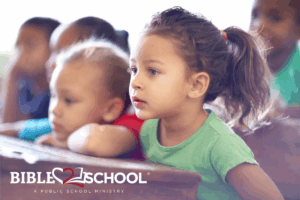This article was written by Dr. Robert Crosby and Pastor Kayla Smith with Reach Hurting Kids Institute.
The word “trauma” arises more and more often among communities invested in caring for children.
It is a heartbreaking reality of our world – two out of three kids will experience at least one traumatic event during their childhood.
These events have devastating effects on children’s minds, hearts, and spirits, leaving them feeling afraid, out-of-control, rejected, and worthless.
We can see the impact of childhood trauma in our children’s ministries:
- Matthew shrinks back from engaging with peers and adults.
- Joanna lashes out when she’s given instructions.
- Diego runs and hides at any sign of conflict.
- Amber disrupts her small group constantly.
But how can the church serve these hurting kids? How can we teach them about the love of Christ in the midst of their struggle?
When teaching kids who have experienced trauma, your ministry faces an uphill battle.
But the first step toward victory is to understand how trauma affects learning so we can respond in a way that helps kids learn and succeed at church.
Parenting Affects Trauma
Trauma has a lasting negative impact on the way kids experience the world.
For example, the way our parents treat us in early childhood determines how our brains will respond to other people in the future.
When parents are loving and responsive, children learn that they are worthy of love and that other people can be trusted.
In other words, their brains are wired to respond positively to other people.
But when parents are abusive or neglectful, children learn that they are not worthy of love and that other people cannot be trusted.
Their brains are wired to respond negatively to other people.
They aren’t trying to be rude – it happens automatically.
The child sees the whole world through “trauma-tinted sunglasses” that make everything seem worse than it really is.
Trauma Impairs Brain Development
Trauma also causes impaired brain development.
When a child is very young, only the lower parts of their brain – like the brain stem – are fully functional.
These parts of the brain handle basic survival functions like eating, sleeping, and fighting off or running away from danger.
The upper parts of the brain – like the temporal lobes and the prefrontal cortex – develop as the child ages.
These parts of the brain handle higher-order functions like solving problems, learning about the Bible, keeping emotions under control, or comforting a friend.
When these areas are underdeveloped due to childhood trauma, it is physically more difficult to control our minds, bodies, and emotions.
When pushed past our limits, we become dysregulated and out of control.
How Trauma Affects Learning
This has a huge impact on the child’s ability to learn and succeed at church.
When a child feels dysregulated, they can’t pay attention.
They might express their feelings inappropriately.
So, instead of learning, they end up getting themselves in trouble and missing out.
When things get hard, they give up easily.
And sometimes, they refuse to try something new, because that’s better than suffering the humiliation of yet another failure.
Kids who have experienced trauma tend to get in trouble a lot more than other kids.
They really want to succeed, and they don’t understand why they keep messing up.
Breaking Barriers
Childhood trauma creates barriers that prevent hurting kids from coming to Jesus.
But it doesn’t have to be that way!
Once we come to understand how trauma affects the brain, we need to become trauma-informed churches.
While there are many specific strategies you can apply, here are three trauma-informed teaching principles to transform your children’s ministry:
1. We have to meet kids’ basic needs before they can learn.
Kids who have experienced trauma might come to church feeling afraid, dysregulated, rejected, or worthless.
But they need to feel safe, regulated, loved, and valued. We have to meet all of these basic needs before our kids will be ready to learn.
Real Life Example
Pastor Michelle struggled to keep her kids’ attention during large group ministry.
She tried every trick she knew to capture their imagination, but the kids were often distracted and irritable.
When she realized that many of the children at her church were chronically hungry, she redesigned their teaching structure to set the table for them all.
The dynamic of the group shifted entirely after that – with full bellies and hearts full of belonging, her students listened closely, answered questions, and participated fully.
Meeting their basic needs opened the door for deeper learning and connection.
2. Kids learn more about the gospel from how we treat them than from the lesson itself.
Caring for kids’ needs is actually one of the best ways for them to fully experience and understand the truth of scripture!
As St. Francis of Assisi said, “Preach the gospel at all times. Use words only when necessary.”
When we take the time to prioritize our kids’ needs and value them as individuals, we preach the gospel in a language we all can understand.
Real Life Example
Mr. Andrew noticed that Theo was having trouble sitting still during the lesson.
He invited him to the back of the room to help prepare an activity for the group.
Once Theo was clearly feeling calmer, Mr. Andrew offered a fidget toy to hold as he sent him back to his seat.
In this scenario, it’s tempting for children’s leaders to assume that Theo is missing out on the lesson altogether, but when we reframe our understanding of the gospel, we see that Theo experienced the good news of Christ, too!
Theo encountered the Fruit of the Spirit (namely, self-control) as Mr. Andrew helped him find regulation.
Imagine how differently this lesson could’ve unfolded if his need for regulation hadn’t been met!
When we stop to show love and compassion to the kids in our ministries, they learn more about the gospel from those experiences than from any lesson.
3. Teaching is an opportunity to build kids up by helping them achieve meaningful accomplishments.
Studying God’s word is crucial for spiritual growth, and it’s also a powerful way to minister to kids who have experienced trauma – especially those who struggle with feelings of worthlessness.
Real Life Example
Ethan was not exactly a star student – he was years behind in every subject at school, and he was constantly in trouble.
His young life was full of traumatic events, and Ethan was struggling.
He was scared as he started to attend children’s ministry, but he was also excited about all the cool events – especially the sixth-grade trip.
In order to go on the trip, however, Ethan had some big challenges to meet, including journaling, reading missions books, and memorizing scripture.
Pastor Tracy said she believed in Ethan, and she promised to help him every step of the way.
Ethan worked harder than he ever had before, and over the next several months, he completed all of the challenges required for the trip!
Pastor Tracy brought Ethan and all of the other sixth graders who completed the challenge onto the platform one Sunday morning to celebrate their hard work.
For the first time in his life, Ethan was proud of himself.
He had worked so hard, and, with the help of his pastor, he found success.
Pastor Tracy did not lower her expectations for him; rather, she lifted him up so that he could point to this success and say,
“Wow! I did that!” That has the power to actually transform the way a child sees themselves.
Trauma Can Be Healed
Trauma certainly has a lasting negative impact on the way kids experience the world, learn, and behave.
But…our God is a God of redemption!
The exciting thing is that just like traumatic experiences change the way their brains are wired, positive experiences – like feeling loved and valued in your church – also change the brain.
This is called neuroplasticity.
It means that, down to our neurons, God has created us as people who are able to grow and form into His likeness for LIFE.
Together, we will tear down the barriers that prevent hurting kids from coming to Jesus and welcome the most vulnerable among us into the family of God.
To learn more about trauma-informed children’s ministry and how you can equip your team to serve hurting kids, visit reachhurtingkids.com.

About Robert
Robert Crosby, Ph.D. is the executive director of Reach Hurting Kids Institute. A former children’s director with over twenty-five years of experience in children’s and youth ministry, he is the world’s leading scholar in children’s ministry research. He recently co-authored Trauma-Informed Children’s Ministry: A Practical Guide to Reaching Hurting Kids.

About Kayla
Rev. Kayla Smith is the Associate Director of Reach Hurting Kids Institute and serves at Trevecca Community Church of the Nazarene as Pastor of Intergenerational Discipleship. She spends most of her time tagging along on her five-year-old’s adventures. Kayla draws from her background in leadership and special education to empower churches to embody Christ’s love for every child. She leads workshops, trains children’s and youth teams, and consults with leaders about trauma-informed practices in the Church.






